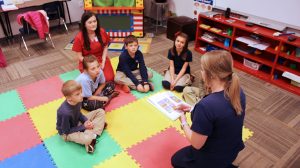
UM communication sciences and disorders graduate students Emily Reedy (in red), of Pontotoc, and Lauren Stantz (in blue), of Houston, practice reading skills with area youth in preparation for the upcoming Ready to Read Literacy Program. UM photo by Sarah Sapp
OXFORD, Miss. – The speech-language pathologists who operate the University of Mississippi’s Speech and Hearing Center are bringing their expertise to a communitywide literacy program designed to improve children’s reading skills before they reach third grade.
“We know that if kids aren’t reading on grade level by the time they get to the third grade, they are four times more likely not to graduate high school,” said Suzanne Ryals, Oxford School District early childhood reading development director.
Opportunities are limited for many first- and second-graders to continue advancing their reading skills over the summer, Ryals said. Faculty in the UM Department of Communications Sciences and Disorders, recognizing the deficit of programming geared toward this particular age range, have launched an initiative to fund a summer and after-school literacy program addressing the problem.
A 30-day Ignite Ole Miss crowdfunding campaign is being launched to provide financial resources for the “Ready to Read” program. Those interested in contributing to the campaign can choose from six levels of giving: $25 Sight Word Level; $50 Phonics Level; $75 Chapter Book Level; $100 Novel Level; $250 Graduate or $1,000 Ph.D. Level. Contributions to the campaign will directly benefit program participants by covering the costs of materials, books and scholarships.
The Ready to Read summer camp will serve rising second- and third-grade children and will operate for six weeks, June 4-July 27, from 8 a.m. to 11:30 a.m. daily.
“Before camp begins, the children will be scheduled for a reading diagnostic assessment, followed by a series of criteria-referenced assessments where the child’s skill level in five different areas – phonological awareness, phonetics, word attack skills, reading fluency and reading comprehension – will be identified,” said Brad Crowe, UM Speech and Hearing Center co-director and clinical instructor. From these assessments, each child will have a list of reading goals that will be taught during camp.”
Following the summer camp, the speech-language pathologists and graduate clinicians hope to provide an after-school reading program for children with reading disabilities.
“Since we can identify children at risk for reading disabilities with greater reliability than ever before, we would like to offer a preventive program for kindergarten and first-graders in the long term,” Crowe said.
One clinical faculty member will be present at all times to supervise up to four graduate students as they provide individualized and small-group instruction to the children, said Ann Michael, interim chair for CSD.
“First, the faculty member will observe the instruction and interact with the student and the child,” Michael said. “They will then meet with each graduate student to review each child’s achievement for the day and work with the graduate student to modify the child’s plan as needed for the next day.
“This process will ensure the children receive quality services and that the graduate student is pushed to develop critical thinking and research skills in order to transform the lives of others.”
Gloria Kellum, CSD professor emeritus and vice chancellor emeritus for university relations, explained the camp’s importance to UM graduate students studying to become speech-language pathologists.
“It has long been known, and the research is very clear that a child with any type of speech, language or hearing difference is going to have reading challenges, so speech-language pathologists need to be educated about that,” Kellum said. “Part of our program is to educate SLPs and audiologists on the necessary role of early speech and language intervention for children to be sure that they are hearing, speaking correctly and learning the language skills.”
“We have the skill set to work with children who have reading difficulties,” said Lisa Ivy, literacy program director, speech-language pathologist and clinical instructor with the Speech and Hearing Center. “We know that the sounds that we use to talk are the same sounds we match with letters when we are sounding out words, and that helps with reading.”
The camp is centered on themes, such as ocean animals, community helpers and insects. The camp clinicians also make time for science experiments, snacks, crafts and playground time.
“We will read books together and discuss vocabulary,” Ivy said. “The children will have breakout sessions where they work on their individual skills. Then we may read as a group.”
Kelle Sumrall, a seventh-grade science teacher at Lafayette Middle School, understands firsthand the critical importance of early literacy for future educational success. Her son Ben attended three weeks of literacy camp during last summer’s pilot program.
“As a teacher and a mother of someone who struggles with reading, I think the program does a wonderful job of attending to my child’s needs and helping him grow, build better self-esteem and be more successful,” Sumrall said.
“Ben loved the themes of the week. He was very excited about what he was going to take, what they were going to talk about and what they were going to do each day. That was one of the things that got him really excited about going.
“When SLPs are running this program, they have a better grasp of what to connect to the child, and they get to know the child personally. They realize their strengths and weaknesses, so that they can develop the program to better suit the needs of the child.”
For more information about giving to this campaign, visit http://ignite.olemiss.edu/literacy. Those who prefer to contribute by mail can do so by writing the program’s name in the check’s memo line and sending it to the University of Mississippi Foundation, 406 University Ave., Oxford, MS 38655.
For more information about attending the literacy summer camp or after-school program, contact Ivy at lisa.ivy@speechandhearingcenter.org or 662-915-7950.